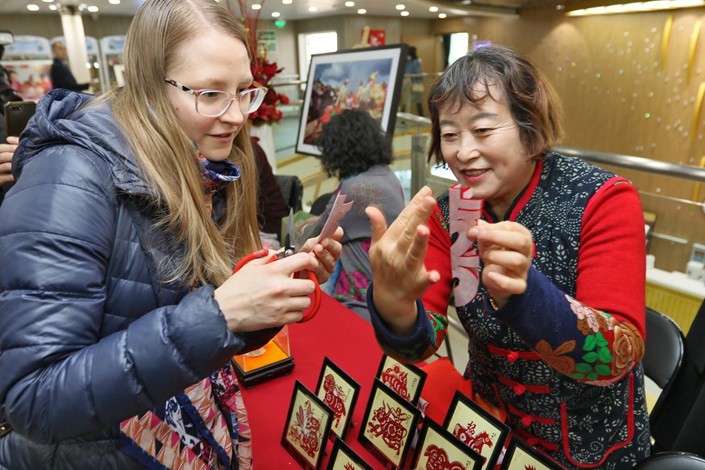
In 2001, there were 75,000 foreign students studying in China. One of them was me, studying Mandarin in Tianjin. By 2019, the 130-kilometer journey from Tianjin to Beijing that took me a full two hours in 2001 had shrunk to just 30 minutes. During the same period, the number of international students coming to China had ballooned to over 500,000.
In 2001, there were 134 international routes into China, serving annually nearly 7 million overseas passengers. In 2019 that number had grown to 74 million passengers travelling along 953 international routes. Each of us living and working in China has our own stories and can point to data that help illustrate the immense changes that have happened to our lives and our industries in China since accession to the WTO 20 years ago.
Optimism in 2001 China was abundant. I remember vividly the excitement of my Mandarin teacher in Tianjin after buying her first car that year; a brand new Geely JL6360E1. Affordable, private motoring could suddenly be enjoyed by many. Beijing, it was announced in 2001, would host the 2008 Olympics, and in December, finally, China’s accession to the WTO could be celebrated. The excitement in the air 20 years ago was palpable. China was moving to stand shoulder-to-shoulder with other nations on the international stage. China’s outlook and public sentiment were buoyant.
Looking back over 20 years, some people might have imagined but few would have predicted the huge shifts that have taken place since China’s entry into the WTO. Many events that have occurred since 2001 could not be predicted, modeled or anticipated. Some have had and continue to have far-reaching consequences: the September 11 attack on the World Trade Centre in New York; the resulting war against terror; the 2008 financial crisis, and the rise of populism in the West; a growing backlash against globalization; the realities of climate change; and, of course, the Covid-19 pandemic.
It is easy to look back with the benefit of hindsight and forget that China’s path toward growth and achieving a moderately well-off society was never certain or inevitable. Much could have happened over the course of the past 20 years that would have led to very different outcomes than where we are today.
Forecasts, analysis and reports on what the future holds for China are abundant. Whilst inputs and factors are the same, the principles and mechanics of the underlying system are fundamentally different. China’s development has confounded many Western political economists. It is my belief that China will continue to do so.
One thing that I have observed regularly over the past 20 years is that China, almost perpetually, appears to be at a pivotal point. This continues today. Those of us working here know that China’s business environment is fraught with ambiguities and contradictions, and we have learned to live with it, if not to accept it. We exercise judgement, often daily, in order to chart a course for our businesses locally and advise head offices in far-off lands. This judgement is essential and it comes from years of first-hand experience living in, studying and working here.
It is this aspect where my own optimism for the future is losing some of its luster. International flights to China have been grounded for nearly two years. According to the latest business sentiment survey by the British Chamber of Commerce, about 50% of the U.K. companies operating in China are unable to bring staff overseas back to China. The number of international passengers in 2020 was 10 million. Based on monthly data published up to September, a total of 1 million international passengers have travelled so far this year, or just 2% of 2019 levels. There is no data to show the flow of foreign students into China. Covid-19 has disrupted our world. My concern is that as one tumultuous year becomes two, and now potentially three or more, we lose the flow of people living, learning, understanding and gaining perspective on China.
I believe that stemming this flow of talent over time has consequences. Over time our ability to exercise good judgement on China is weakened. Remote engagement and second-hand insight can never be a substitute. Pre-conceived ideas and perceptions formed without first-hand experience will begin to cloud the judgements of decision-makers. In such a scenario, the risk of misunderstanding increases, along with the ability to sense and respond to a complex and dynamic environment. So, while we celebrate 20 years of China’s WTO accession, we must remind ourselves that the next 20 years are not inevitable or predetermined for China and the world.
The choices we make will continue to shape outcomes and we must continue to be open and determined about collaboration for our future. If perceptions become set, and positions entrenched, then our future may be confined just to a handful of scenarios, not because they are inevitable, but because the good judgement and conviction needed to fight for any alternative are no longer abundant.
Julian MacCormac is chair of the British Chamber of Commerce in China.
The views and opinions expressed in this opinion section are those of the authors and do not necessarily reflect the editorial positions of Caixin Media.
If you would like to write an opinion for Caixin Global, please send your ideas or finished opinions to our email: opinionen@caixin.com
Get our weekly free Must-Read newsletter.







